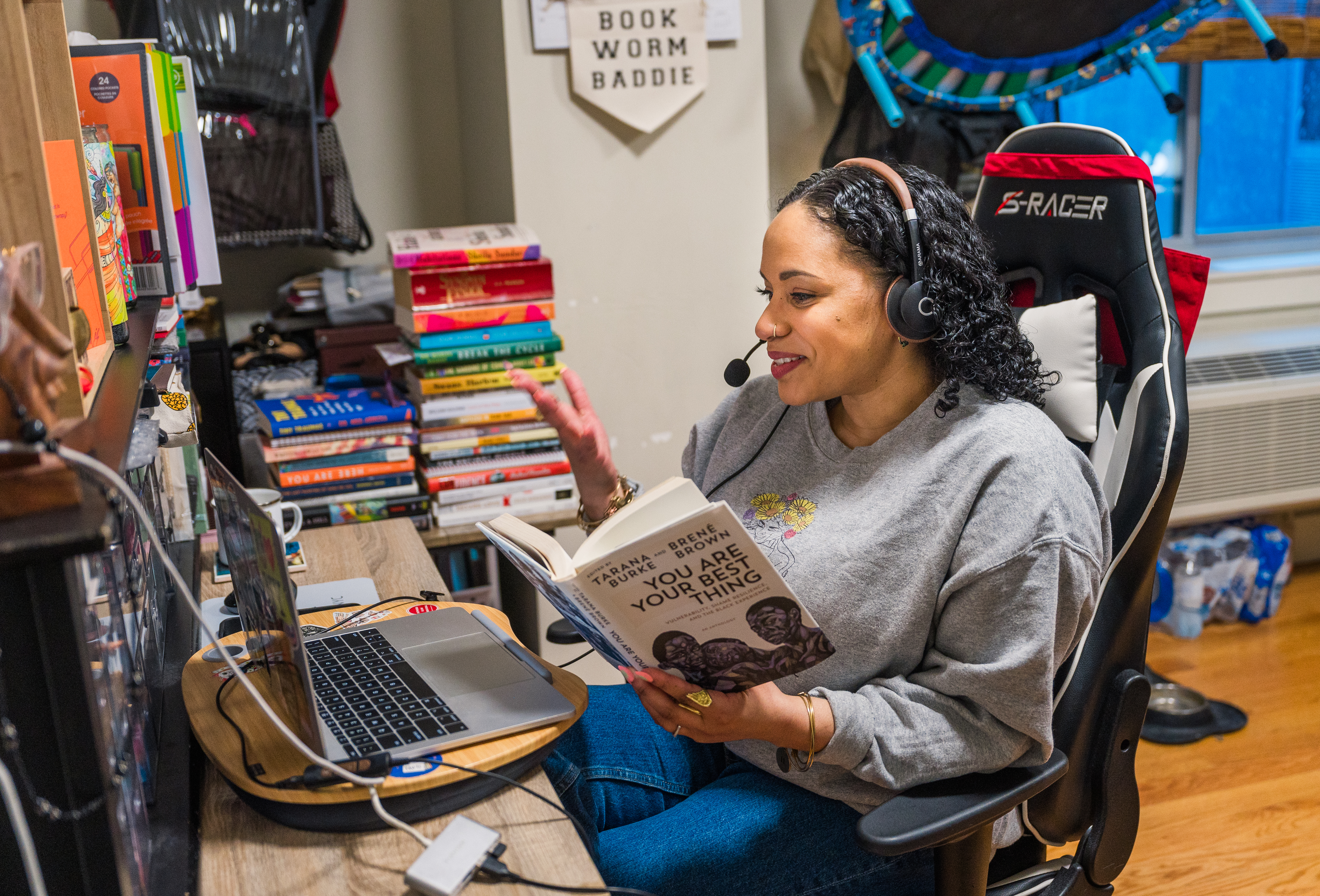
5 minute read
A Day in the Life
What does a day in the life of a social worker look like? Social work is one of the fastest growing professions in the U.S. and it allows for an enormous range of specialties and career paths. SSW alumni serve clients in a multitude of impactful ways throughout the United States and the world. Explore the day to-day lives of just a handful of distinguished alumni, featuring the work of those in private practice, sex therapy, bibliotherapy, higher education, macro practice and more. Dive into their lives and learn how they balance client care, family life, hobbies and self-care.
Editor’s note: The following stories include composite scenarios of clients and do not represent any real clients. First names are used throughout to encourage connection with these snapshots of people’s intimate lives.
Turning Pages, Changing Lives
THE MAGIC OF BIBLIOTHERAPY
-By Megan Rubiner Zinn, Photos by Shana Sureck Photography
In 2020, Emely Rumble, M.S.W. ’10, LCSW, was settled in a career she loved as a school social worker in the Bronx, but life had a different plan. As the COVID pandemic turned the world upside down, Emely’s two-year-old son was diagnosed with autism and she became pregnant with her second child. “And so I was one of those two million women who had to leave the workforce,” she said ruefully. Fortunately, Emely had the skills and experience to remake her career. She had been working with a group practice part time and had long considered establishing a private practice, but hadn’t because she loved her work in schools. “I think this was the momentum, or maybe the challenge, that I needed to knock me off my seat to get it done.” Additionally, this was her chance to more fully pursue her love of bibliotherapy.

Emely had started incorporating bibliotherapy into her practice when she interned at a facility for adults with schizophrenia, running socialization groups focused on reading and writing poetry. As a school social worker, she used storytelling in English language arts classrooms.
“We’d come up with alternative endings to stories, do role-playing, write letters to the main characters—getting the kids really interested in fictional stories. And then as a result of that, getting them telling their own stories and learning each other’s stories.”
With her move to private practice, Emely launched LiterapyNYC—“Where literature and therapy meet to provide the everyday bibliophile with mental health support and diverse reading recommendations.” Bibliotherapy uses literature to help clients make sense of their concerns and see them from different perspectives. Emely incorporates bibliotherapy into her psychotherapy practice with New York clients and offers it as a coaching service to those outside of the state. To further broaden her qualifications, Emely is training with the International Federation of Bibliopoetry Therapy to become a certified poetry therapist (CPT).
In addition to working with clients, Emely teaches bibliotherapy in the CUNY/Queens College master of library science program. She has collaborated in the past with The Bronx is Reading, who nominated her as a Mover & Shaker of the Year in 2023, and has built close relationships with her local librarians, often making recommendations of diverse books to acquire.

With a busy professional life and a young family, Emely structures her days to ensure she consistently incorporates practices to nurture her own mental health. This usually means starting at 5 a.m. “I try to have that little bit of time in the morning for myself, for prayer, meditation, to be able to drink my coffee hot and just to have a quiet start to the day.”
By 6:30 a.m., she is taking the kids to school. She uses that commute time— walking and riding public transportation—to read, listen to audiobooks or music and move her body.
Back home, Emely will respond to emails and prepare for her workday. From 10 a.m. to 1 p.m. she sees psychotherapy clients via telemed. Then she’s out again to pick up her children. Once they’ve settled into activities and homework, she’ll focus on networking, writing blog posts and other tasks to develop her still nascent business, as well as prepare for her bibliotherapy sessions.
In the afternoon, Emely’s husband, a middle school educator, returns home and takes over parenting. This gives her concentrated time to see clients. On some evenings, she’ll also participate in a peer group session—part of a supervision group of women of color in private practice, a crucial part of her professional life. “Without professional support and professional collaborations, I wouldn’t be where I’m at today, honestly,” she said.

This is also a time where she may do podcast interviews or work on revisions of her book, Bibliotherapy in the Bronx, which will be published by Row House Publishing in April of 2025.

Hopefully, by 8:30 p.m. Emely and her husband have gotten the kids into bed so they can spend some time together before they go to sleep. This may be time to read and enjoy the quiet. But like many of us, they may just use this time to relax on the couch and watch Netflix, she admitted.










